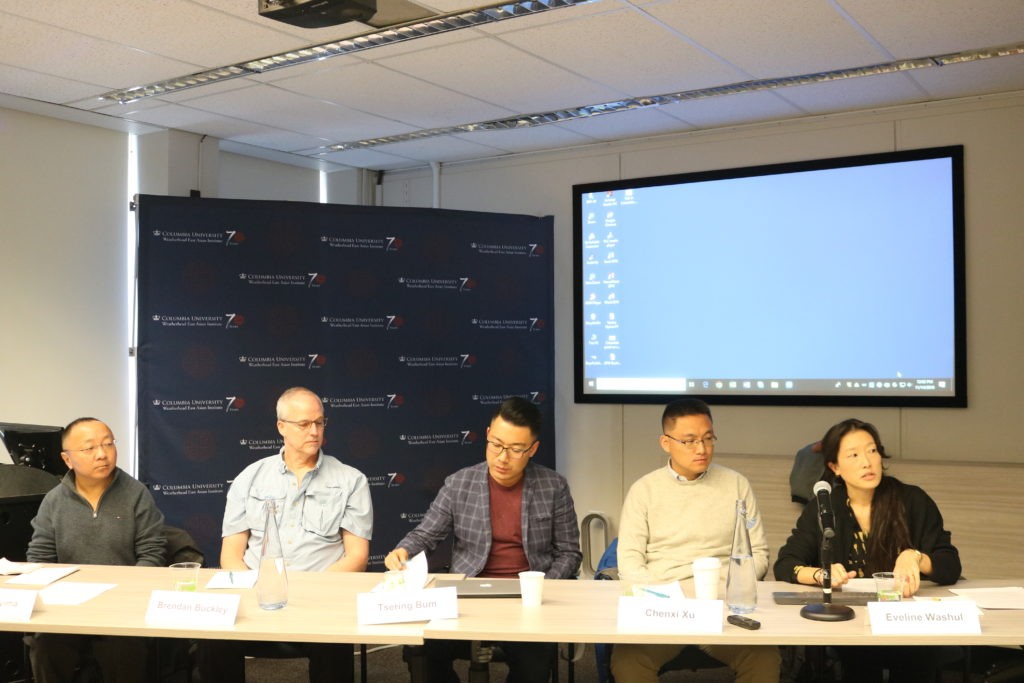"Understanding Climate Change on the Tibetan Plateau: Environmental Conservation Research and Climate Science Approaches"

Understanding Climate Change on the Tibetan Plateau: Environmental Conservation Research and Climate Science Approaches
Weatherhead East Asian Institute Event
Please join us for a panel discussion with:
Yonten Nyima, Visiting Research Scholar, NYU Wagner Graduate School of Public Service
Brendan Buckley, Lamont Research Professor, Lamont-Doherty Earth Observatory, Columbia University
Tsering Bum, Ph.D. candidate, Department of Anthropology, Emory University
Chenxi Xu, Associate Professor, Institute of Geology and Geophysics, Chinese Academy of Sciences (IGGCAS)
Discussants:
Brendan Buckley, Lamont Research Professor, Lamont-Doherty Earth Observatory, Columbia University
Eveline Washul, Modern Tibetan Studies Program, Weatherhead East Asian Institute, Columbia University
Event summary:
The Tibetan Plateau is the largest high-altitude region in the world and is incredibly important as a source of water, biodiversity, and mineral resources on the Asian continent. This also makes it one of the most sensitive areas to climate change. In past decades, the Tibetan Plateau has seen more significant warming than surrounding regions due to its higher altitude. As such, Tibetan communities are at the forefront of experiencing the impacts of climate change.
This round table brings together social science researchers working with Tibetan pastoralist communities in China and climate scientists who have worked in the Himalayas and Asia to discuss how interdisciplinary approaches might enrich understandings of climate change on the Tibetan Plateau and contribute to our knowledge of global climate change.
Speakers Bios:
Brendan Buckley holds the position of Lamont Research Professor, and has been a long-time member of the Tree Ring Lab at the Lamont-Doherty Earth Observatory of Columbia University (LDEO). While he has worked in locations around the globe, Buckley has been one of the pioneers of tropical dendroclimatology, having produced the longest and best replicated records of absolutely dated tree ring sequences from Southeast Asia. Among his most important discoveries were the identification of two key periods of drought that coincided with the two most tumultuous periods of the past millennium over Southeast Asia – the Angkor droughts of the late 14th/early 15th century, and the Strange Parallels Drought of late 18th century, respectively. He continues this important work by using new methods to develop discrete seasonal reconstructions of regional hydroclimate, including measures of the strength of summer and winter monsoons, as well as the “shoulder” seasons that lead into and out of them, over the past millennium. Buckley is a proponent of interdisciplinary research, working with historians, archaeologists, geochemists and atmospheric scientists.
Tsering Bum is from Mangra County in Amdo Tibet (Qinghai Province, China). He is currently a PhD candidate of Environmental Anthropology at Emory University. From 2012 to 2016, he worked as program manager and researcher at a Chinese environmental NGO dedicated to biodiversity conservation in western China. At this NGO, he mainly worked with Tibetan pastoralist communities to establish community-based resource management teams to implement biodiversity monitoring, waste management, and human-wildlife conflict resolution work. Currently he is doing dissertation research on the impacts of increased monastic and statist wildlife conservation efforts on pastoralist communities, specifically focusing on how wildlife conservation practices are transforming socioeconomic structures and power relations amongst Tibetan pastoralist communities.
Yonten Nyima is a human geographer specializing in Tibetan pastoralism. He is currently a visiting Research Scholar at the Robert F. Wagner Graduate School of Public Service, New York University. His main research interests are development and environmental policies, pastoralism, rangeland and natural resource management and access, indigenous knowledge and climate change, and cultural politics and resistance. Dr. Yonten Nyima draws from political ecology and political economy in examining rationales for, implementation of, and socioeconomic, cultural, political and ecological effects of China’s ongoing development and environmental policies in Tibet. He has published peer-reviewed articles on Tibetan pastoralism in journals including Society and Natural Resources, Conservation and Society, Human Ecology, and Area.
Chenxi Xu holds the position of Associate Professor at the Institute of Geology and Geophysics, Chinese Academy of Sciences (IGGCAS). He has been engaged in research on tree ring oxygen isotope and global changes and has contributed to the development of dendrochronology and dendroclimatology in tropical and subtropical areas. His main contributions include: 1) studies on oxygen isotope of trees with and without ring structure in Southeast Asia that indicate that tree ring oxygen isotope can be used as a new method to cross-date trees in the tropics; 2) systematic comparisons that showed that tree ring oxygen isotope in monsoonal Asia significantly correlated with summer moisture changes, and thus the history of summer moisture changes in various locations (Laos, Thailand, Vietnam, India, Nepal and China) in the Asian monsoon region can be reconstructed based on this relationship. His hydroclimate reconstructions reveal South Asian summer monsoon has weakened in the past 200 years, and the increased sea surface temperature in the Indian Ocean that resulted in reduced land-sea thermal contrast is the main reason for the weakening of the South Asian summer monsoon.
This is a Weatherhead East Asian 70th Anniversary event.
Cosponsors: Modern Tibetan Studies Program, Lamont-Doherty Earth Observatory, Columbia University
